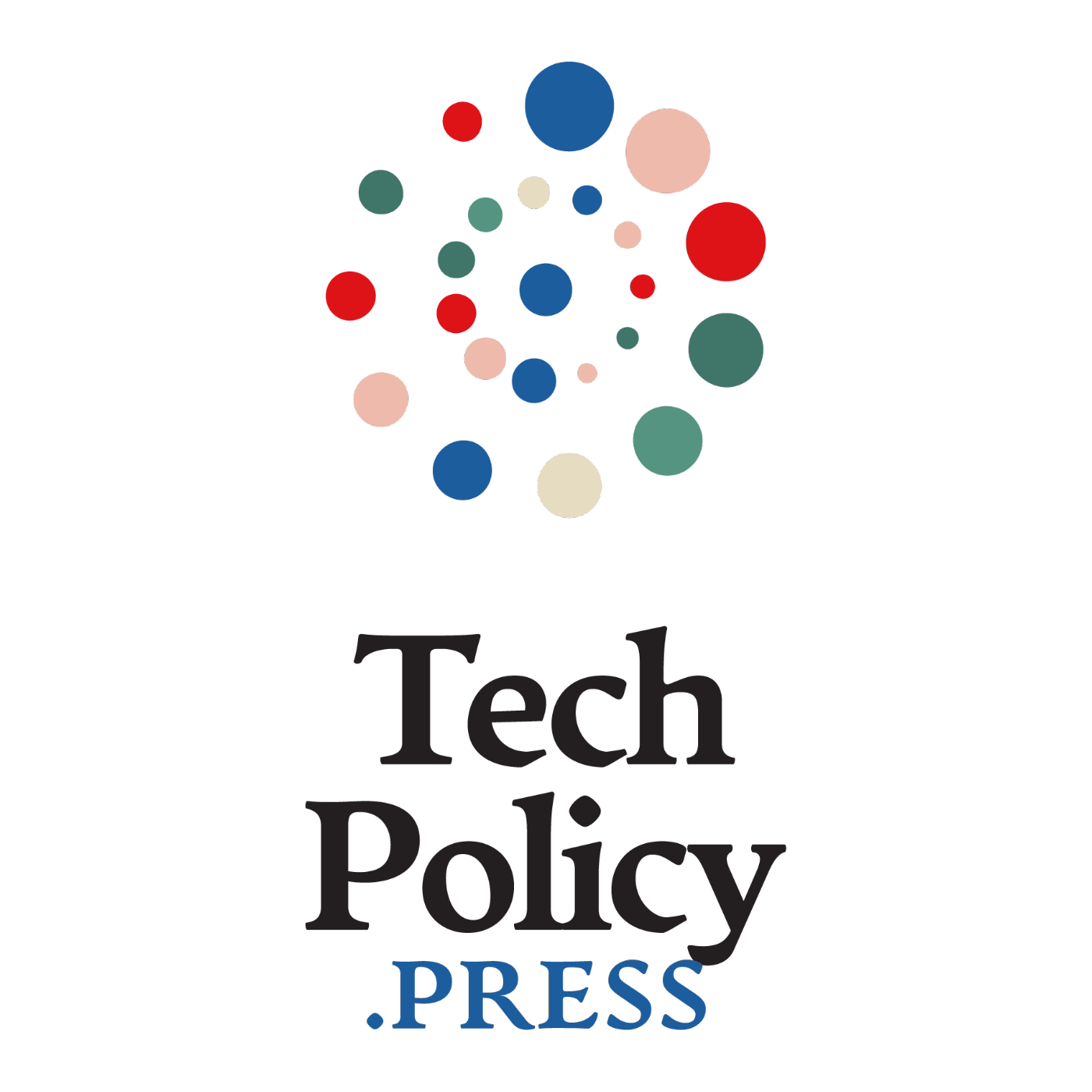The Tech Policy Press Podcast – Détails, épisodes et analyse
Détails du podcast
Informations techniques et générales issues du flux RSS du podcast.

The Tech Policy Press Podcast
Tech Policy Press
Fréquence : 1 épisode/4j. Total Éps: 300

Classements récents
Dernières positions dans les classements Apple Podcasts et Spotify.
Apple Podcasts
🇬🇧 Grande Bretagne - technology
03/08/2025#94🇬🇧 Grande Bretagne - technology
02/08/2025#89
Spotify
Aucun classement récent disponible
Liens partagés entre épisodes et podcasts
Liens présents dans les descriptions d'épisodes et autres podcasts les utilisant également.
See all- https://checkmyads.org/
25 partages
- https://www.patreon.com/thismachinekills
220 partages
Qualité et score du flux RSS
Évaluation technique de la qualité et de la structure du flux RSS.
See allScore global : 42%
Historique des publications
Répartition mensuelle des publications d'épisodes au fil des années.
Considering Trump’s AI Plan and the Future It Portends
jeudi 24 juillet 2025 • Durée 53:57
Yesterday, United States President Donald Trump took to the stage at the "Winning the AI Race Summit" to promote the administration's AI Action Plan. Shortly after it was published, Tech Policy Press editor Justin Hendrix sat down with Sarah Myers West, the co-director of the AI Now Institute; Maia Woluchem, the program director of the Trustworthy Infrastructures team at Data and Society; and Ryan Gerety, the director of the Athena Coalition, to discuss the plan and what it portends for the future.
Centering Disability Rights in US Tech Policy 35 Years After ADA
jeudi 24 juillet 2025 • Durée 46:26
This weekend, the Americans with Disabilities Act (ADA) turns 35. Signed into law on July 26, 1990, the law provides broad anti-discrimination protections for people with disabilities in the US, and has impacted how people with disabilities interact with various technologies. To discuss how the law has aged and what the fight for equity and inclusion looks like going forward, Tech Policy Press fellow Ariana Aboulafia spoke with three leaders working at the intersection of disability and technology:
- Maitreya Shah is the tech policy director at the American Association of People with Disabilities.
- Blake Reid is a professor at the University of Colorado.
- Cynthia Bennett is a senior research scientist at Google.
Addressing Questions Over Europe's AI Act, Digital Sovereignty, and More
dimanche 15 juin 2025 • Durée 44:11
In Europe, the digital regulatory landscape is in flux. Over the past few years, the EU has positioned itself as a global leader in tech regulation, rolling out landmark laws like the AI Act. But now, as the much-anticipated AI Act approaches implementation, the path forward is looking anything but smooth. Reports suggest the European Commission is considering a delay to the AI Act’s rollout due to mounting pressure from industry, difficulties in finalizing technical standards, and geopolitical tensions—including pushback from the US government. At the same time, a broader movement for Europe to reduce its dependence on Amercian tech is gaining momentum: What does this push for digital sovereignty actually mean?
To help us unpack all of this, Tech Policy Press associate editor Ramsha Jahangir spoke to Kai Zenner, Head of Office and Digital Policy Advisor to German MEP Axel Voss, and one of the more influential voices shaping the future of EU digital policy.
Big Tech and the News
dimanche 30 juin 2024 • Durée 41:32
News and journalism organizations and dominant tech companies are in a years-long battle over content, clicks and revenue, and the tech companies are winning. What are policy options that encourage both the sustainability and quality of news content on popular online platforms? In this episode, Rebecca Rand explores perspectives on the subject, drawing on a conversation hosted by Justin Hendrix with experts Anya Schiffrin and Cory Doctorow at the Knight Foundation's INFORMED conference earlier this year.
Understanding the Digital Silk Road
dimanche 23 juin 2024 • Durée 49:44
In October 2023, during the third Belt and Road Forum in Beijing, China's leader Xi Jinping signaled a shift in focus from more grandiose physical infrastructure projects to 'small yet smart' initiatives. This shift underscores the need to understand China's ambitions to reshape global digital governance, moving away from an open and free internet towards a model rooted in government control and mass surveillance.
The advocacy group Article 19 documents this shift in a recent report titled "The Digital Silk Road: China and the Rise of Digital Repression in the Indo-Pacific," examining China's influence on digital infrastructure and governance in Cambodia, Malaysia, Nepal, and Thailand. As the Indo-Pacific remains strategically significant for China in deploying next-generation technologies, the report argues that assessing China’s regional partnerships and their implications for digital repression is crucial for understanding its broader ambitions to reshape global digital norms.
To discuss these issues in more depth, Justin Hendrix is joined by:
- Michael Caster, Asia Digital Program Manager at ARTICLE 19; and
- Catherine Tai, the deputy director for Asia and the Pacific team at Center for International Enterprise (CIPE).
Internet Governance Is At A Crossroads
dimanche 23 juin 2024 • Durée 50:45
In this episode, we explore a topic that sits at the heart of global digital policy: the contrasting visions of internet governance championed by the United States and its Western allies versus those promoted by China and nations in its orbit. This debate is playing out across various international venues and has profound implications for the future of digital rights, privacy, and the open internet. Justin Hendrix is joined by experts at the Atlantic Council that study these issues from a variety of angles and across multiple geographies, including:
- Rose Jackson, the director of the Democracy + Tech Initiative within the Atlantic Council Technology Programs;
- Konstantinos Komaitis, a nonresident fellow with the Democracy + Tech Initiative of the Atlantic Council's Digital Forensic Research Lab;
- Kenton Thibaut, a senior resident China fellow at the Atlantic Council's Digital Forensic Research Lab; and
- Iria Puyosa, a senior research fellow at the Atlantic Council’s Digital Forensic Research Lab.
How China Regulates Tech
dimanche 23 juin 2024 • Durée 39:24
Angela Zhang is the author of High Wire: How China Regulates Big Tech and Governs Its Economy, published this year by Oxford University Press. With a career in the practice of law and in teaching it, Zhang has held roles King’s College London and at New York University School of Law, and most recently served as Director of Philip K. H. Wong Center for Chinese Law at the University of Hong Kong. She will join the University of Southern California as a Professor of Law in fall 2024.
The Demise of CrowdTangle and What It Means for Independent Technology Research
vendredi 21 juin 2024 • Durée 27:31
A topic we returned to often in this podcast is the dire need for independent technology researchers to have access to platform data. Without it, we cannot understand the extent of the harms and effects of social media on people and on society, and we cannot understand the limits of those harms. This makes it difficult to respond in acute moments such as elections, and to understand issues such as the relationship between tech platforms and social cohesion, or mental health, or any number of the other issues policymakers care about.
In this episode, Justin Hendrix speaks with two people on the front lines of the fight to secure access to data, including advocating for Meta to do better in light of the impending deprecation of CrowdTangle, a tool used by researchers study Meta's products, including Facebook and Instagram. They are:
- Brandi Guerkink, the executive director of the Coalition for Independent Technology Research, and
- Claire Pershan, EU advocacy lead at the Mozilla Foundation.
Finding the Humanity in an Automated World
mardi 18 juin 2024 • Durée 34:12
Madhumita Murgia, AI editor at the Financial Times, is the author of a new book called Code Dependent: Living in the Shadow of AI. The book combines reporting and research to provide a look at the role that AI and automated decision-making is playing in reshaping our lives, our politics, and our economies across the world.
A Conversation with White House Office of Science and Technology Policy Director Arati Prabhakar
dimanche 16 juin 2024 • Durée 35:17
Dr. Arati Prabhakar the Director of the White House Office of Science and Technology Policy and Technology Policy and Science Advisor to President Joe Biden. This week, she hosted an event in Washington DC called "AI Aspirations: R&D for Public Missions." Speakers included executive branch officials and agency leaders, from the Secretary of Education to the Food and Drug Administration Commissioner, as well as lawmakers such as Senators Amy Klobuchar and Mark Warner, and Representative Don Beyer. Prior to the event, Justin Hendrix spoke to Dr. Prabhakar about OSTP's priorities.









